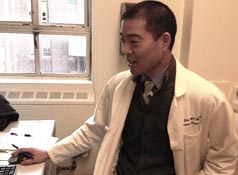
By Kate Rauch
A 2008 breakthrough study showed a clear benefit in starting HIV positive patients on antiretroviral therapy early after a diagnosis of opportunistic infections such as pneumocystis pneumonia. Days and weeks can make a difference in patient survival, the study showed.
But a second study, published in the September 29, 2011, issue of Clinical Infectious Diseases, represents a further breakthrough for what it indicates about using research results to help patients, said Elvin Geng, MD, a UCSF assistant adjunct professor of infectious diseases.
Is this community, this municipality, this population getting the most medical benefit they could from the treatment we have?Elvin Geng, MD
This second study by Geng and his colleagues compared various ways that SFGH physicians used results of the 2008 study and applied it to their practice. According to Geng, the results were dramatic.
Prior to the 2008 findings, few HIV patients received antiretroviral therapy early on, or within two weeks after being diagnosed with an opportunistic infection. Following the study, this number initially increased by approximately 50% as medical providers learned about the research results through the conventional means of conferences, meetings, and conversations with colleagues.
The SFGH HIV team then launched a targeted health education campaign on the benefits of early antiretroviral therapy —meeting one-on-one with physicians in leadership positions, widely distributing educational materials, and even working to speed up the completion of insurance forms on the drug coverage.
This effort boosted the number of patients on anti-retroviral drugs to about 85%.
To Geng, this result confirms his passionate commitment to the concept of Implementation Science, which examines how to effectively apply medical research results in communities or population groups.
“The unit of analysis is the healthcare unit, not the patient,” said Geng, who also directs several HIV studies in Africa.
The relationship between a physician and patient is important, Geng says, but equally important is the relationship between medical knowledge and its use—or helping large numbers of people benefit from proven treatments and techniques.
According to Geng, the question to ask is, “Is this community, this municipality, this population getting the most medical benefit they could from the treatment we have?”
Geng took Implementation Science courses through UCSF’s Clinical and Translational Science Institute (CTSI) in 2009, while he was a Fellow in Infectious Diseases. CTSI offers various training opportunities in this emerging field, ranging from project consultation to a specialized Masters Degree. Geng notes that while the classes taught him valuable skills in study design and methodology, one of the most powerful take-aways was the connection to like-minded medical professionals.
Implementation Science is a multidisciplinary field encompassing medicine, as well as sociology, economics, political science, anthropology, and more. Different perspectives bring different priorities, as well as various ways of measuring change or success, Geng said. “As a physician, I can tell how I’ve done on a particular case. It requires a different set of skills to examine how a system is doing on a larger level.”
Buoyed by the SF General results, or Implementation Science in action, Geng looks forward to expanding his research. “I think it’s the future of medicine,” he said. “Because so much of the time we already know what we should do, we just don’t know how to do it.”
Learn more about CTSI’s Training and Advancement Resources, and its Implementation Science training opportunities.
